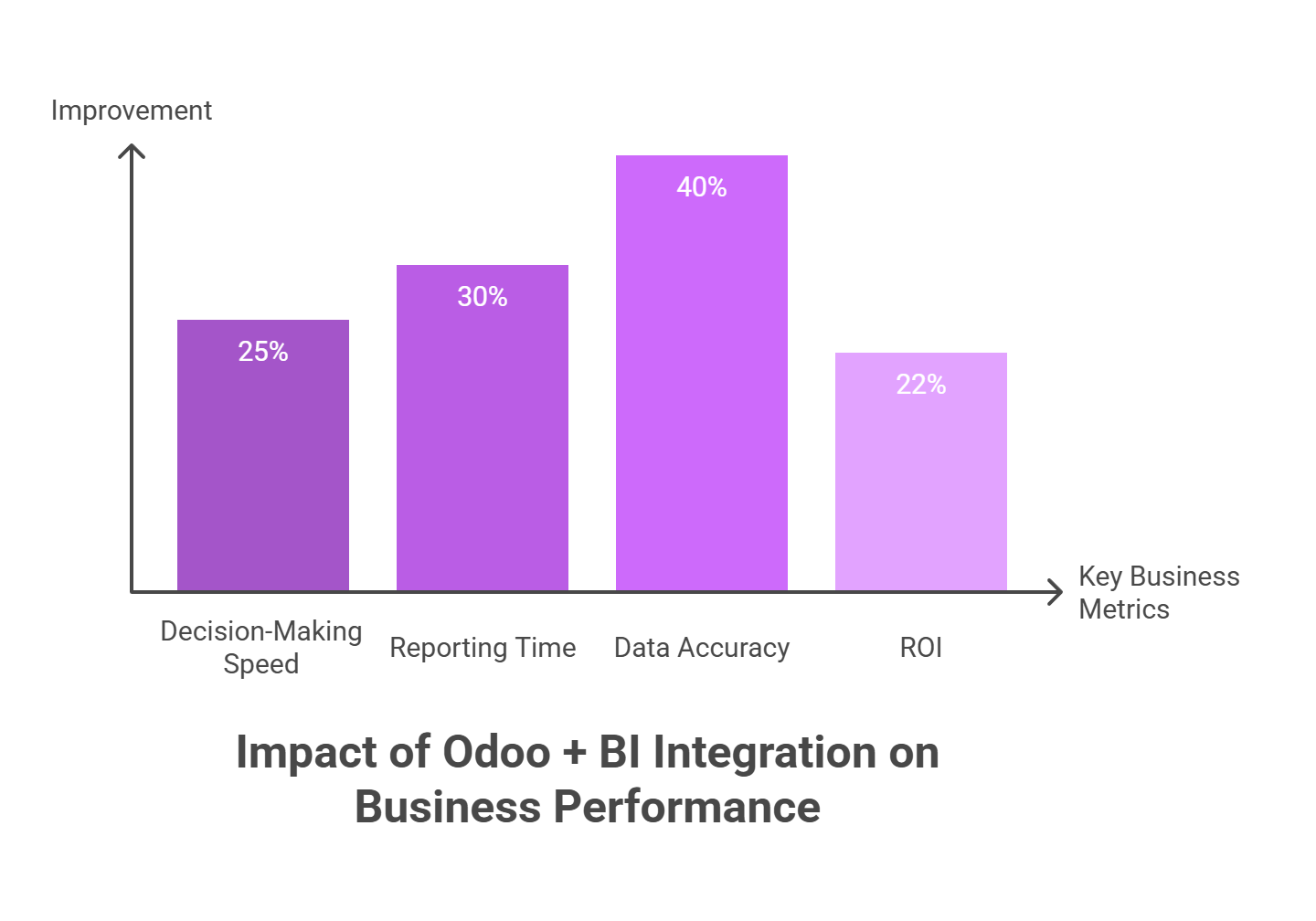
Odoo + Business Intelligence: Turning Egyptian Companies into Data-Driven Organizations
Discover how Odoo and Business Intelligence empower Egyptian companies to centralize data, automate insights, and make smarter, faster business decisions today.
ERPBUSINESS INTELLIGENCE
Key Points
Data-driven organizations rely on consistent, accurate data to guide decisions across all departments.
Egyptian companies face fragmented data, slow reporting, and poor ROI from existing BI tools.
Odoo ERP centralizes finance, HR, sales, inventory, and CRM, enabling unified data entry and operational automation.
Standard ERP reporting is limited; integrating BI tools with Odoo provides real-time dashboards, analysis, and forecasting.
BI dashboards turn Odoo data into actionable insights across sales, inventory, finance, and operations.
Integration improves decision-making speed, reporting efficiency, data accuracy, and ROI from analytics.
Actionable takeaway: Connect Odoo ERP to a BI platform, build role-specific dashboards, and train teams to use insights for faster, data-driven decisions.
Why Data-Driven Transformation Matters for Egyptian Companies
What does it mean to be a data-driven organization?
A data-driven company uses consistent, accurate data to guide decisions instead of guesswork. Departments from operations to finance rely on one version of truth and can act quickly.
How are Egyptian businesses evolving in their use of data and digital tools?
Egypt is actively pushing digital transformation. For example, the country’s ICT sector grew 15.2% in FY 2022/23 and now contributes 5.1% of GDP.
Additionally, the start-up and data investment ecosystem are picking up momentum.
What are the main challenges companies face with scattered or unstructured data?
Data fragmented across multiple systems (finance, operations, CRM) which hinders end-to-end visibility.
Slow reporting and manual consolidation of spreadsheets, delaying decisions.
Poor ROI from existing BI tools because data input is inconsistent or unreliable.
These match the pain points you identified:
Data scattered across multiple systems
Slow reporting process
Poor ROI from existing BI tools
What Odoo Brings to the Table
What is Odoo and how does it integrate across business functions?
Odoo is an ERP platform that covers modules like finance, HR, sales, inventory, and CRM, all under one architecture. Its strength is the modular but integrated design. Data entered in one function becomes available elsewhere without redundant re-entry.
Why is Odoo uniquely suited to Egyptian companies’ operational and financial structures?
Its flexibility means it can be adapted to local business practices, multiple currencies, or regional reporting standards.’
Cloud or on-premise deployment means companies of various sizes (50–500+ employees) can adopt it.
Given Egypt’s push for digitization and the need for unified processes across departments, Odoo provides a practical platform.
How does Odoo simplify data collection and automation across teams?
Odoo features built-in dashboards, pivot analyses, and operational reporting across modules. It allows data entry once and distribution for multiple uses (operations, finance, management) without manual duplicate work.
The Missing Piece: Business Intelligence Integration
What limitations do companies face when using Odoo without BI?
Standard reporting in an ERP context often addresses yesterday’s data, not real-time insights.
Advanced analysis (cross-module KPIs, forecasting, scenario modelling) can be cumbersome in ERP alone.
When companies rely on manual exports to Excel, they recreate the very problem that unified systems were meant to solve.
How does BI extend Odoo’s value by transforming raw data into insights?
Business Intelligence tools connect to Odoo (and possibly other data systems) to:
Create interactive dashboards and visualisations.
Combine data from multiple modules and sources (sales, inventory, HR, finance).
Provide real-time monitoring of performance, trends, and exceptions.
Forecast outcomes and help users ask “what-if” questions rather than just “what happened.”
Explain the synergy between Odoo data and BI dashboards.
Odoo supplies the structured, integrated data. A BI layer delivers analysis and visualisation. For example:
Sales module provides order data → BI dashboard tracks sales velocity, conversion, top products.
Inventory module provides stock or turnover data → BI dashboard highlights slow-moving items, warehouse efficiency.
Finance provides P&L or cash-flow data → BI dashboard projects future liquidity and flags cost-centre performance.
According to Odoo’s official site: “Integration between Odoo apps provides you with complete and real-time data. Learn how to read it and improve decision-making.”
Real-World Benefits of Integrating Odoo with Business Intelligence
How does integration lead to better decision-making and performance tracking?
Decision-making speed improves when management sees live dashboards and responds faster instead of waiting for monthly reports.
Reporting time reduces because fewer manual consolidations mean less time lost.
Accuracy improves with fewer manual transfers and less risk of error.
ROI increases as analytics enable more strategic action instead of purely operational reaction.
What key metrics can companies visualise using Odoo data?
Sales performance: by product, by region, by salesperson.
Inventory efficiency: stock turnover, excess or obsolete inventory.
Financial forecasting: cash-flow projection, margin analysis, cost-centre performance.
Operational KPIs: downtime, throughput, resource utilisation.
Stats supporting the benefit of BI adoption:
Companies using BI tools report up to 25% faster decision-making processes.
A study of Egyptian companies found that digital transformation (including analytics) significantly reduces costs.
Egypt’s national strategy highlights data-driven insight as a pillar of its digital transformation vision.


Getting Started: The Roadmap to a Data-Driven Organization
How should a company begin integrating BI with Odoo?
Step 1 – Assessment & Visioning: Define the strategic questions you want answered. What decisions are you making (or not making) because you lack insight?
Step 2 – Implementation & Customisation of Odoo: Deploy or optimise Odoo modules to ensure data is collected accurately and consistently across domains.
Step 3 – Data Modelling & Integration: Extract, transform, and load data into a warehouse or BI tool so that Odoo data (and possibly other systems) can feed dashboards.
Step 4 – Dashboard Design & Visualisation: Build dashboards suited to decision-makers (CEOs, Heads of Data or Operations) with clear KPIs and actionable insights.
Step 5 – Training & Change Management: Equip teams to use dashboards, interpret insights, and adjust processes based on findings.
Step 6 – Ongoing Review & Optimisation: Monitor dashboard usage, refine data sources, and adapt to evolving business needs as the company grows from 50 to 500+ employees.
How can Exology guide this process from planning to execution?
With expertise in BI solutions, data analytics, digital transformation, and Odoo implementation, Exology partners with companies in Egypt and the MENA region to navigate each step. From dashboard design to training and ongoing support, our goal is to transform data into action.
How Exology Helps
Exology implements Odoo for clients in Egypt and the MENA region, enabling integrated data capture across finance, operations, sales, and HR.
We connect Odoo data with advanced BI dashboards so decision-makers see live, meaningful insights instead of static reports.
We address key pain points you identified: scattered data, slow reporting, and poor ROI from BI tools by building systems that unify data, automate reporting, and deliver clear business value.
Our tailored consulting and training support ensure your team not only gets the system but also uses it to drive smarter decisions and transformation.
Read More
Contact us
Whether you have a request, a query, or want to work with us, use the form below to get in touch with our team.




